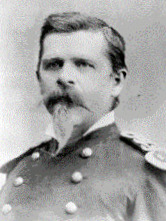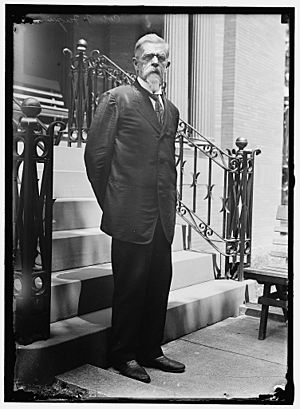Frederick W. Füger facts for kids
Quick facts for kids
Frederick W. Füger
|
|
|---|---|
 |
|
| Born | June 18, 1836 Göppingen, Germany |
| Died | October 13, 1913 (aged 77) Washington D.C. |
| Place of burial | |
| Allegiance | United States of America Union |
| Service/ |
United States Army Union Army |
| Years of service | 1856–1900 |
| Rank | |
| Commands held | |
| Battles/wars | American Civil War • Battle of White Oak Swamp • Battle of Antietam • Battle of Gettysburg • Battle of Dinwiddie Court House |
| Awards | Medal of Honor |
Frederick W. Füger (born June 18, 1836 – died October 13, 1913) was a brave soldier and officer in the U.S. Army. He earned the highest military award, the Medal of Honor, for his amazing courage during the Battle of Gettysburg. This happened on July 3, 1863, when he helped defend the Union army's spot on Cemetery Ridge against a huge attack called Pickett's Charge.
Early Army Life
Frederick Füger was born in Germany in 1836. He moved to the United States in 1853. In 1856, he joined the 4th U.S. Artillery. His unit, Battery A, traveled a lot.
They served in different parts of the country:
- In Florida in 1856, during conflicts with the Seminoles.
- In Kansas in 1857.
- In Utah in 1858, during conflicts with the Mormons.
- In Nevada in 1860, during conflicts with the Paiutes.
Serving in the Civil War
Füger's first five years in the army were almost over in 1861. But then, the American Civil War began with the Battle of Fort Sumter. Füger decided to stay and fight. He joined the army again and was promoted to First Sergeant. He served in Battery A, 4th U.S. Artillery. This unit was led by Lieutenant Alonzo Cushing.
Heroism at Gettysburg
In July 1863, Füger and his unit were part of the famous Battle of Gettysburg. They were defending a key area called Cemetery Ridge. Confederate soldiers launched a massive attack known as Pickett's Charge.
During this fierce battle, Lieutenant Cushing was badly wounded. Another officer, 2nd Lt. Joseph Milne, was also hurt. Füger bravely took command of the battery. He kept firing their last working cannon even as Confederate soldiers got very close.
Confederate soldiers, led by Brig. General Lewis Armistead, broke through the stone wall. They reached the cannons. Füger and his men fought hand-to-hand to push them back. For his incredible bravery, Füger was awarded the Medal of Honor. He was also made a Second Lieutenant in the U.S. Army.
Füger fought in many battles during the Civil War. He was present at 63 battles and smaller fights. He was wounded twice:
- In the head at the Battle of White Oak Swamp in June 1862.
- In the left arm at the Battle of Antietam in September 1862.
After the War
Frederick Füger continued his military career after the Civil War. He received several promotions for his excellent service:
- In 1865, he was recognized for his brave actions at the Battle of Dinwiddie Court House.
- He became a First Lieutenant in December 1865.
- He was promoted to Captain in March 1887.
- In February 1899, he became a Major.
- Füger retired from the army in June 1900 because of his age. He was 64 years old.
- In 1904, after a special law was passed, Füger was promoted to Lieutenant Colonel in the U.S. Army.
 | Georgia Louise Harris Brown |
 | Julian Abele |
 | Norma Merrick Sklarek |
 | William Sidney Pittman |


